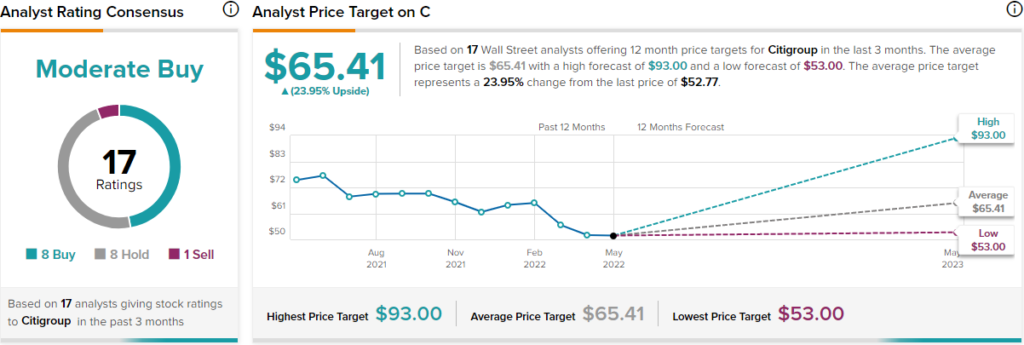The release of 13F reports for Q1 2022 revealed some interesting changes at Berkshire Hathaway (BRK.B).
Elevate Your Investing Strategy:
- Take advantage of TipRanks Premium at 50% off! Unlock powerful investing tools, advanced data, and expert analyst insights to help you invest with confidence.
While some buys, such as Activision (ATVI), were already discussed at Berkshire’s shareholders’ meeting, most new purchases, such as Paramount (PARA) and Citigroup (C), were bid up following the 13F disclosure.
Wells Fargo (WFC) was the most conspicuous sale because Berkshire had held a stake all the way back to 1989. Other notable disposals include COVID-19 beneficiaries such as AbbVie (ABBV) and Bristol-Myers Squib (BMY).
Berkshire continues to build its oil & gas position, with Chevron (CVX) now the conglomerate’s 4th largest holding at $25.9 billion, behind Apple (AAPL) at $155.6 billion, Bank of America (BAC) at $41.6 billion, and American Express (AXP) at $28.3 billion. A new position in Occidental Petroleum (OXY) at $7.7 billion was also disclosed.
In this article, I will dive deeper into the operational performance of Wells Fargo and Citigroup to explain which stock is the better pick at the moment. I am bullish on Citigroup and neutral on Wells Fargo.
Citigroup
Citi reported a 10.5% return on tangible common equity (RoTCE) in Q1 2022, with revenues down 2% year-over-year. For context, in 2021, the RoTCE stood at 13.4%.
Russia exposure was reduced by 20.4% to $7.8 billion, with the bank now estimating the potential loss to be approximately $2.5-3 billion in an adverse scenario.
As we have observed at other banks, the capital position deteriorated during the quarter, driven by adverse market conditions and a 100% payout of net income, bringing the CET1 capital to 11.4%. Citi now targets a 12% CET1 ratio by year-end 2022.
Citigroup currently expects a $2.5-3 billion revenue bump from a 100-basis points parallel shift in the yield curve, which, as explained by CFO Mark Mason on the conference call, should not be used as a one-for-one proxy for net interest income (NII) sensitivity, but I think is a good approximation nevertheless.
Thus taking the midpoint of $2.75 billion, we see that Citi can expect somewhere around a 6.5% uplift to net interest income going into 2023 or a ~4% bump to total revenues.
For context, net interest income was 62% of 2021 revenues, with the rest counted as non-interest revenues, which have been growing steadily in the last five years.
Last but not least, tangible book value was marginally down to $79.03 quarter-over-quarter.
Wells Fargo
Wells Fargo reported a 10% RoTCE for Q1 2022, with revenues down 5% year-over-year. For context, in 2021, the RoTCE stood at 14.3%.
Drawing parallels with Citi, its CET1 ratio was down 90 bps quarter-over-quarter to 10.5%. As confirmed by CFO Mike Santomassimo on the conference call, Wells Fargo plans to run with a 100-150 bps buffer to the regulatory requirement of 9.1%.
As per the 10-Q report for Q1 2022, Wells Fargo expects a $5.7 billion benefit from a positive 100 bps shift in interest rates. Hence the benefit for Wells Fargo from higher rates will be more substantial, at about 15.9% of 2021 net interest income, or 7.3% of 2021 net revenues.
For context, net interest income was 45.5% of 2021 revenues and 55.5% of 2020 and 2019 revenues, with the latter two years offering a better basis for comparison given one-off gains in 2021, which skew the revenue results.
Last but not least, tangible book value was down 3.3% to $35.13 per share.
Comparison and Valuation
| 2021 RoTCE | CET1 Capital | Interest Rate Sensitivity, % of Revenues | Price/Tangible Book | |
| Citigroup | 13.4% | 11.4% | 4% | 0.67 |
| Wells Fargo | 14.3% | 10.5% | 7.3% | 1.25 |
| Difference | 0.9% | -0.9% | 3.3% | 0.58 |
As we can see from the summary table above, there is no clear-cut winner for the currently anticipated rising-rate environment. Citi comes out ahead in terms of CET1 capital position and discount to tangible book value, while Wells Fargo boasts a higher RoTCE and interest rate sensitivity.
At the end of the day, I think that Citigroup comes out slightly ahead, even after accounting for the more substantial Russia exposure, largely due to the discount to tangible book value, which, coupled with a strong capital position, allows for accretive buybacks. These buybacks can easily grow tangible book value, even if operational performance is more muted as compared to Wells Fargo.
In a longer time frame, Wells Fargo has substantially outperformed Citi, and the valuation gap should close over time.
Even after the recent uptick, Citigroup’s share price remains below the prevailing stock price over Q1 2022, which means you can actually buy at a discount to what Berkshire paid, a rare opportunity.
Wall Street’s Take
From Wall Street analysts, Citigroup earns a Moderate Buy consensus rating based on eight Buys, eight Holds, and one Sell rating. Additionally, the average Citigroup price target of $65.41 puts the upside potential at 20.9%.

Wells Fargo also earns a Moderate Buy consensus rating based on eight Buys, four Holds, and zero Sell ratings. Additionally, the average Wells Fargo price target of $58.67 puts the upside potential at 28.7%.

Investor Takeaway
Warren Buffet is quoted as saying, “Be greedy when others are fearful.” In Q1 2022, Berkshire Hathaway did just that, picking up Citigroup stock when it was sold off because of its Russia exposure. However, as recession fears became elevated into Q2 2022, the whole banking space came under pressure, making Berkshire’s position underwater.
I think from the current vantage point, Berkshire still made the right move, and Citi should outperform Wells Fargo going forward.
Discover new investment ideas with data you can trust.
Read full Disclosure















